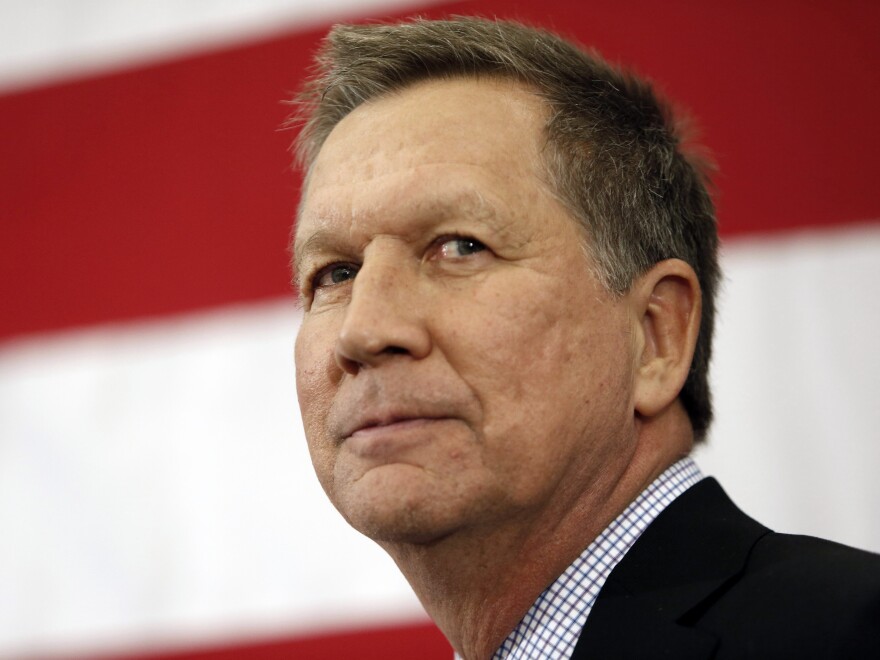North Carolina Public Radio | By Associated Press
Published March 15, 2022 at 4:29 PM EDT

Former Ohio Gov. John Kasich and other speakers on Tuesday shared the experiences of states expanding Medicaid to more working adults, as North Carolina legislators carefully weigh whether they should now accept the coverage.
Kasich, a former Republican presidential candidate, and presenters on programs in Montana, Indiana and Michigan told a General Assembly study committee about successes and challenges after the states accepted expansion through the 2010 federal health care law.
Many spoke about how expansion was fiscally responsible, improved health outcomes by treating cancer and other illness that would otherwise be left unchecked, and reduced the amount of services for which hospitals wouldn’t otherwise be reimbursed.
Kasich, who helped begin Medicaid in Ohio in 2014, also offered a plea of compassion to the lawmakers, making a biblical reference to helping the least fortunate.
There are “a lot of people that need a lot of help. We have to open our hearts to those people,” Kasich said by video conference from Ohio. “That doesn’t mean that when we do that we put ourselves on the road to bankruptcy.”
North Carolina is among a dozen states that haven’t expanded Medicaid under the 2010 federal health care law to those who make too much to qualify for traditional Medicaid but don’t make enough to qualify for government-subsidized private insurance.
Republicans who run the legislature have worried for years about runaway Medicaid spending and have been suspicious of the federal government keeping its end of the financial bargain to cover 90% of costs. Presentations about expansion in these Republican-leaning or purple states may help assuage concerns.
“Great states can not only take care of some of the people, but they have to take care of all of the people in one way or another to make sure that they have an opportunity to be able to have a decent life and to figure out what their God-given purpose is,” Kasich said.
The committee is collecting information on whether expansion and other health care access changes make sense in the nation’s ninth-largest state. Expansion supporters have been encouraged by recent openness from within the GOP, particularly when Senate leader Phil Berger announced in late 2021 that he’d be willing to support the idea. But Berger’s counterparts in the House lost interest as the possibility of mandating work or training requirements for recipients dwindled.
A committee co-chairman has said he’s hopeful that a package of recommendations from the study committee could be voted on by the fuller General Assembly as early as September. Democratic Gov. Roy Cooper is a big expansion proponent. His Medicaid director pitched expansion to the committee two weeks ago.
Although President Donald Trump’s administration approved waivers for such work requirements for a dozen states, courts struck down mandates in Arkansas and Michigan. And President Joe Biden’s administration began withdrawing other approved waivers for work mandates, including those for Ohio. A similar waiver for Montana appears unlikely.
Legislators looking for another method to help potential enrollees become independent economically so they can obtain private insurance wanted more information about a voluntary workforce training program in Montana.
But the HELP-Link program, which was created before current GOP Gov. Greg Gianforte took office, has negligible numbers of participants and often overlaps other government workforce training programs, said Charlie Brereton, chief of staff for the state’s public health department.
Indiana’s expansion program attempts to improve health outcomes and patient responsibility by offering expanded benefits to those who make small monthly payments into a health savings account that helps cover their health care expenses.
Dr. Jennifer Sullivan, a former Indiana Cabinet secretary who now works for Charlotte-based Atrium Health, cautioned lawmakers against expecting that expansion would immediately lead to health care cost savings. Medically frail consumers will seek services they’ve been unable to receive while they were uninsured, Sullivan said. A health insurance industry lobbyist in Michigan also addressed the committee.
North Carolina currently has 2.7 million residents enrolled in traditional Medicaid. While 600,000 residents would likely benefit from expansion in its first two years, about a third of them are currently receiving traditional Medicaid because of the COVID-19 health emergency.
Sullivan said Indiana covers the state’s 10% share of covering enrollees under expansion with the help of an assessment fee paid by hospitals. Cooper has proposed a similar fee to handle North Carolina’s share.
North Carolina lawmakers are examining how other Republican-leaning or closely divided states have expanded Medicaid as they consider whether toexpand the program here.
On Tuesday, a legislative committee heard from leaders of other statehealth departments including Ohio, which expanded its Medicaid program during the tenure of former Republican Gov. John Kasich.
Kasich, who helped get Medicaid expansion started in his state in 2014, told the committee he continues to support Medicaid expansion nationwide.
“Great states can not only take care of some of the people. They have to take care of all of the people in one way or another to make sure that they have the opportunity to be able to have a decent life and to figure out what their God-given purpose is,” Kasich said.
North Carolina’s Medicaid program, which provides health insurance to low-income people and their families, recently changed the way it pays providers, but has not expanded eligibility. The Kaiser Family Foundation estimates nearly 400,000 people would be covered if the state expands Medicaid under the Affordable Care Act.
The Medicaid director in Montana, a former Cabinet secretary for Indiana, and a health insurance lobbyist in Montana were also scheduled to address the panel.
North Carolina is among a dozen states that haven’t expanded Medicaid under the 2010 federal health care law.
Democratic Gov. Roy Cooper is a big expansion booster, but Republican legislators have been cool to the idea. Expansion supporters are encouraged by recent openness from the GOP, particularly Senate leader Phil Berger.
